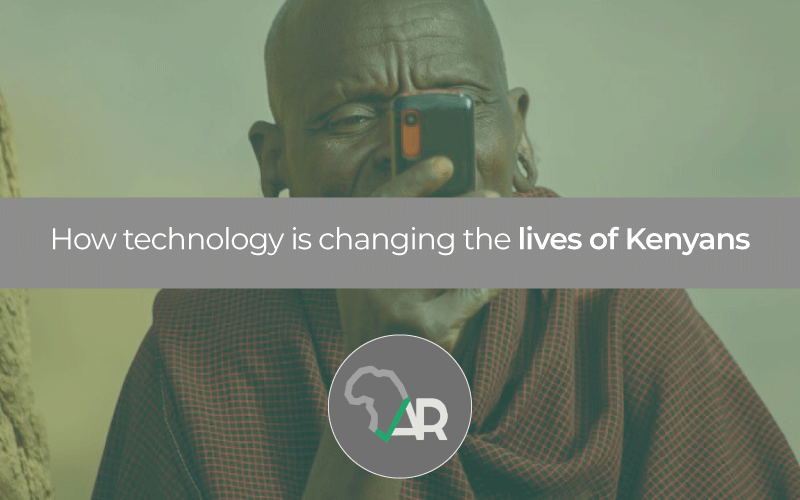How technology is changing the lives of Kenyans
In recent history, the world has witnessed a technological shift that has become an imminent aspect of daily life. One country, in particular, is seeing a rapid influx of change caused by technology.
In just the last decade alone, Kenya has developed in almost every technological sector possible, introducing powerful resources and tools that allow easy access conveniently. If there’s a single revolutionary tool to be mentioned, it’s smartphones.
Smartphone accessibility has been a game-changer
In as little as the last few years, smartphones have transformed everything from health, agriculture, e-commerce, transport to education, and much more. Thanks to smartphones, unlimited accessibility is feasible, something unimaginable just a few years
Ten years ago, only a minority of the Kenyan population had access to smartphones with 3G connectivity. Most relied on 2G phones with poor internet; in contrast, over 80% of the Kenyan population now has access to 3G coverage or higher, showcasing just how far Kenya’s connectivity infrastructure has come.

Kenya’s connectivity infrastructure boom
In a report by the (CA) Communications Authority of Kenya, in 2010, 22 million people had a mobile network subscription; however, in 2018, that number grew to 46.6 million. Kenya falls second to Madagascar for internet speed but has a higher internet speed than Ghana, Namibia, Rwanda, and Uganda combined.
This fast speed, plus the growing number of people with access to smartphones, and the declining cost of the internet, has introduced many online-based jobs. In this last decade alone, we saw the rise of fintechs, e-commerce companies, and the Ubers of the world, causing interruptions to traditional business models, as tech-based innovative models became central to a successful business.
At the start of 2020, figures revealed that Venture Capital funding for African fintech start-ups had grown by 51%, with grants being created for finance apps, consumer credit checks, and virtual banking projects. More reports also presented further growth as new fintechs additionally raised $350 million during the first quarter of 2020. Kenya received investments up to $62 million. These figures show the immense growth Kenya has witnessed and why so many international organisations are focusing on the Kenyan market.
Mobile money has transformed payments greatly; ten years ago, there were approximately 16 million mobile money users across Kenya, completing more than 2 million daily transactions. Fast-forward to 2019, the number of people with mobile money accounts grew to 54.8 million. The approximate value of mobile money transactions per year rose from billions to trillions.
This has revolutionised the face of banking, as users can now receive and send money from abroad using their phones; not only this, but they no longer need to withdraw cash from an ATM machine.
Mobile applications and consumption in the face of technology
E-commerce has shifted the minds of many start-up owners. Owners must now integrate online payments into their business strategies. Many traditional businesspeople are also no longer paying for physical stalls. Instead, they are taking advantage of platforms such as Facebook Market Place to sell their items.
With the introduction of e-commerce that only aims at consumers in larger towns and cities, an additional means of online sales is accessing those living more rurally in villages and presenting an opportunity to buy items online. Several companies are taking advantage by bridging this gap, meaning companies can now reach even more people.
Another critical area that has become a game-changer is introducing taxi-hailing services like Uber, which has immeasurably transformed the transport sector. No longer are Kenyans only resorting to hailing taxis. On the other hand, with this social revolution, consumers can book, share their locations and ride safely at their fingertips.
The technological revolution in the last decade has pushed through so many doors, from healthcare to traditional media consumption to agriculture. Sadly, many Kenyans cannot afford healthcare, and thanks to technological advancements, several mobile applications have been developed to grant people access to various healthcare solutions, yet again this shows the link between technology and an ever-growing market for companies to reach.
Technology has also benefitted the agricultural industry in the last decade. Farmers are now able to access the online market sphere, which they could not do previously. Many online applications have allowed these farmers more freedom and many start-ups have seen this as an emerging sector.
Unsurprisingly technology has also revolutionized how Kenyans are consuming content. Gone are the days where televisions, newspapers, or the radio were required to access media. Today, Kenyans access their media from their smartphones, and this means global organisations can access audiences in Kenya far better and more conveniently.

The rapid demand for Swahili translation services
Increasing financial progress in Africa, unfortunately, carries its effects only on a select few countries. However, several Swahili-speaking countries make it onto this list. Despite this, Kenya where Swahili is the main language of communication might be surpassing the other countries on the list.
Kenya is the largest economy in Central and East Africa and is the epicentre of Africa’s financial services market. Therefore, there is a growing demand for business and reliable Swahili translation service providers.
The importance of finding the right Swahili translation provider to reach your audience.
Translations do not only support in merging communications but also assists in pushing the language barrier out of Africa and builds prosperous relations with foreign companies.
One of the challenges awaiting companies that wish to approach the Kenyan market is ensuring effective translation services that accurately replicate the correct values that can authentically connect to consumers in the most optimum way. Kenya is an emerging technology hub with an average of 50 million to 100 million Swahili speakers so getting it right is vital.
For successful translations in Kenya, organisations are creating fully adapted translation campaigns that consider several socio-cultural aspects. This, subsequently, allows companies to echo their intended message with the target audience to create a brand image they can connect with. Whether companies require the translation of a fintech brochure or a financial document translation in Kenya, it’s essential to get it right.
How you put across thoughts and messages in a language your audience can understand is essential. This is why we have a growing team of in-demand Swahili translators ready to help you break into the Kenyan market.
